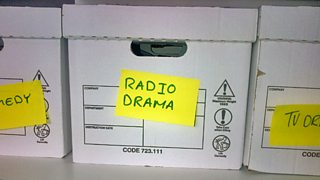
So the readers made a move from comedy to radio drama. ( there’s only so much hilarity you can take in one big chunk.) And we were lucky again (twice in a week, spooky) to have a hugely experienced and knowledgeable Â鶹ԼÅÄ colleague – radio drama producer David Hunter - drop by and talk to the readers about how they look at radio scripts and writers for radio. We discussed some very useful headline thoughts:
• Radio scripts should feel easy to read – they should flow, have rhythm, not be too dense or text-heavy – if you’re struggling to read a script then an audience will almost certainly struggle to listen to it
• Producers enjoy seeing a true diversity of worlds, language (as in idiom), tone, style and stories that are representing the whole of the UK as we know it rather than just a little bit
• Stories need to have a contemporaneity about them – even if they are not a contemporary setting, what is it that’s contemporary about the reason for telling the story now, for an audience now? (It’s also very very hard to make ‘period’ pieces come to true engaging, convincing life…)
• Stories need a fresh perspective and you want them to feel in some way ‘adventurous’ – to have a story to tell, to be willing to challenge form (without trying to be clever and ‘innovative’ just for the sake of it)
• Scripts should try to avoid having too many characters – because radio is not the best medium for a multiplicity of voices – and they certainly wouldn’t say no to more strong female protagonists
• Scripts often start with lots of talking, but stories should grab the reader/listener straight away and surprise us straight away – it’s all too easy to turn off/turn over/tune out – so think about how to use sound to hook the attention
• It’s important for the audience/reader to see in the opening minutes/pages why you are passionate about telling this story
• Just because it’s drama, doesn’t mean it can’t be funny, or told with a lightness of touch – the Radio 4 Afternoon Play is a great place for single comedy-dramas, and/or stories that seek to make the audience laugh as well as move them
• Beware overwriting – less is usually more, don’t make the words do all the work, remember that sound/acoustic are your tools/palette
• And: beware farming/agricultural in the Afternoon Play (as it follows The Archers); be careful with what feel like reverent biographies (they can be very dull); be wary of fast-upcoming plays marking memorial/anniversary dates (they will almost certainly already have commissioned an established writer to cover it – so, for example, they already have some huge in the pipeline )

And what did the readers notice when they ploughed into the scripts?
• A large number of plays in which characters sit around chatting a lot (usually over cups of tea) but where nothing really seems to be happening
• Plays (like the above) that get off to a slow start and don’t grab or hook straight away with the story/drama
• Plays with very heavy narration, or with static monologues which relate what has happened rather than exist in a dramatic moment/present
• Plays with little enough in the way of story, narrative and plot
• Plays which didn’t have a strong enough sense of clarity - or clarity of story purpose
• Plays with visual (rather than audio) cues that simply could not work for a radio audience
• Historical stories that don’t seem to have a contemporary imperative/perspective
So, in fact, more or less the converse of what a producer is probably looking for. And as such, a complex set of problems.
And what about the much smaller proportion of ones that are in fact progressing past the first sift? Unanimously, it was where the readers didn’t quite know what was going to happen, but where there was a strong sense of them going somewhere, and where they really wanted to read on to find out where that was. So in a way, there’s something very simple about the urge to say ‘yes’ to a script at this stage.
It’s a tricky thing, this writing business.
Read Paul's blog on the latest script room comedy submissions .
